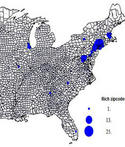The iconic view of tech companies almost invariably stress their roots in people’s garages, plucky individual entrepreneurs ready to challenge all comers. Yet increasingly the leading tech firms – Amazon, Apple, Facebook, Amazon and especially Google – have morphed into vast tech conglomerates, with hands in ever more numerous, and sometimes not obvious, fields of endeavor. read more »
Economics
How a Few Monster Tech Firms are Taking Over Everything from Media to Space Travel and What it Means for the Rest of Us
America's Glass Half-empty, or Half-full?
The stock market is high, real estate prices have resurged, even the unemployment rate is dropping, yet Americans still feel pretty down about the future. A survey released in January by the AP-NORC Center for Public Affairs Research had 54 percent of respondents expecting American life to go downhill over the coming decades. In a December survey, 23 percent of respondents said things will improve over time. read more »
- Login to post comments
Blue-Collar Hot Spots: The Cities Creating The Most High-Paying Working-Class Jobs
It’s a common notion nowadays that American blue-collar workers are doomed to live out their lives on the low-paid margins of the economy. They’ve been described as “bitter,” psychologically scarred and even an “endangered species.” Americans, noted one economist, suffered a “recession” but those with blue collars endured a “depression.” read more »
- Login to post comments
Rich, Poor, and Unequal Zip Codes
Income inequality is an increasingly dominant theme in American culture and politics. Data from the IRS covering mean and median income of filing households for 2012 by zipcode allow us to map and interpret the fascinating geography of income differences. Where are the richest areas, the poorest and the most unequal? read more »
Selfies Replace Focus on Big Picture
Maybe it's my age, but, somehow, the future does not seem to be turning out the way I once imagined. It's not just the absence of flying cars, but also the lack of significant progress in big things, like toward space colonization, or smaller ones, like the speed for most air travel or the persistence of poverty. read more »
Why State Economic Development Strategies Should Be Metro-Centric
Globalization, technology, productivity improvements, and the resulting restructuring of the world economy have led to fundamental changes that have destroyed the old paradigms of doing business. Whether these changes are on the whole good or bad, or who or what is responsible for bringing them into being, they simply are. Most cities, regions, and US states have extremely limited leverage in this marketplace and thus to a great extent are market takers more than market makers. They have to adapt to new realities, but a lack of willingness to face up to the truth, combined with geo-political conditions, mean this has seldom been done. read more »
- Login to post comments
The Divisions In The One Percent And The Class Warfare That Will Shape Election 2014
There’s general agreement that inequality will be the big issue of this election year. But to understand how this will play out you have to go well beyond the simplistic “one percent” against everyone else mantra that has to date defined discussion of inequality. read more »
- Login to post comments
Political, Economic Power Grow More Concentrated
Generally speaking, we associate the quest for central government control to be very much a product of the extremes of left and right. But increasingly, the lobby for ever-greater concentration of power – both economically and politically – comes not from the fringes, but from established centers of both parties and media power.
Recently, for example, an article by Francis Fukuyama, a conservative-leaning intellectual, called for greater consolidation of federal power, most particularly, the Executive Branch. Ironically, Fukuyama's call for greater central power follows a line most often adopted by “progressive” Democrats, who seek to use federal power to enforce their views on a host of environmental, economic and social issues even on reluctant parts of the country. read more »
The Abuse of Art in Economic Development
City building is an imperfect process. Poverty, segregation, and income disparities persist, or worsen, despite longstanding efforts to affect change. The unsightliness of these social failures are called “blight”. Blight is commonly thought to be the antithesis to beauty. read more »
NewGeography's Top Stories of 2013
A new year is upon us, here’s a look back at a handful of the most popular pieces on NewGeography from 2013. Thanks for reading, and happy New Year. read more »






















